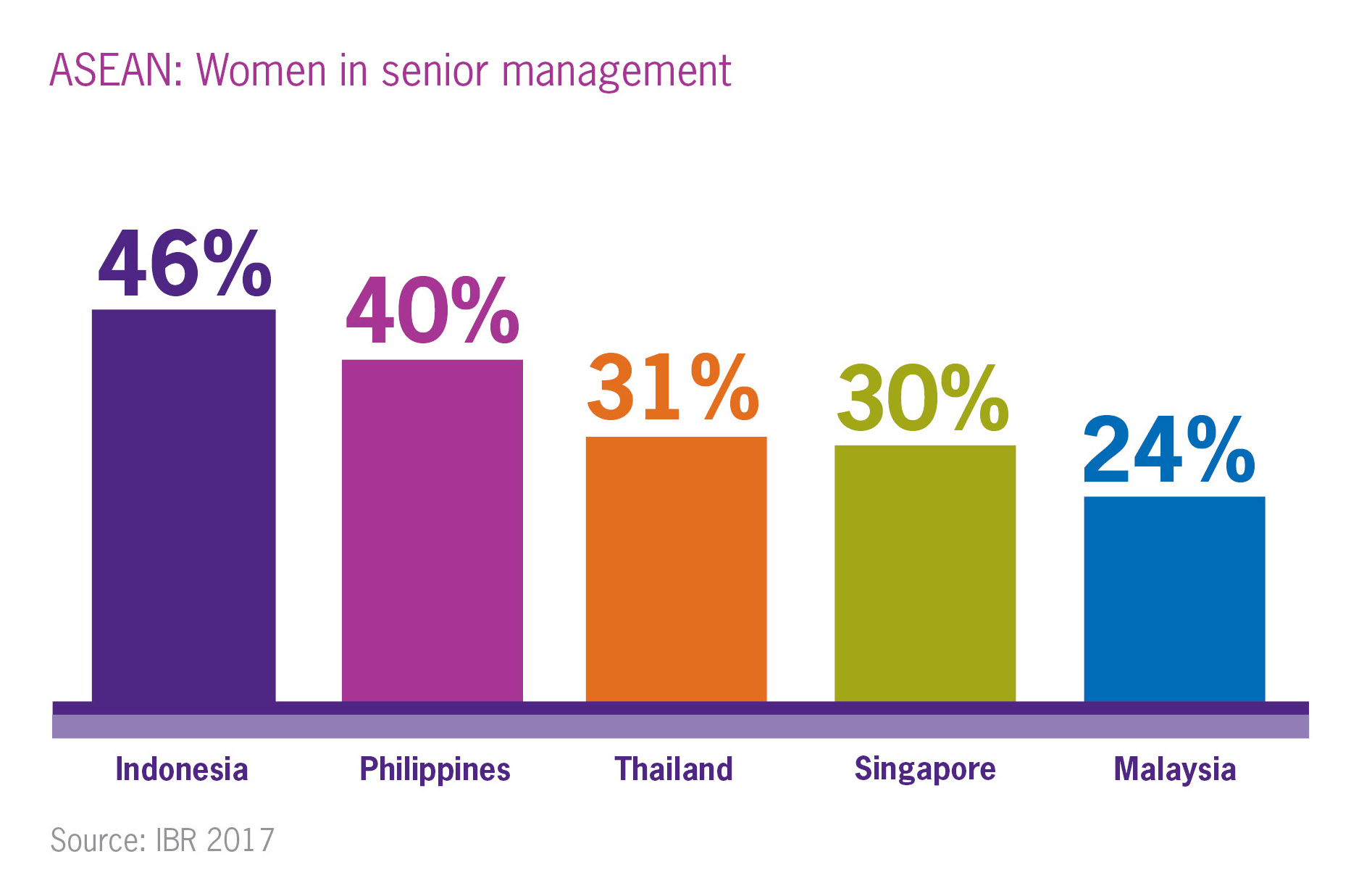This is the second consecutive year of having the least senior business roles held by women in ASEAN
Kuala Lumpur, 8 March 2017 - On International Women’s Day, a new report based on Grant Thornton’s annual survey of 5,500 businesses in 36 economies reveals that Malaysia has the lowest proportion of senior business roles held by women in ASEAN.
24% of senior business roles are held by women in 2017, down from 26% last year and 34% of businesses have no women in senior management, up from 31% last year.
In the ASEAN region, Indonesia has the highest proportion of senior business roles held by women (46%), followed by Philippines (40%), Thailand (31%) and Singapore (30%). Malaysia has the least senior business roles held by women at 24%.

Dato’ NK Jasani, Country Managing Partner of Grant Thornton Malaysia said: “This is the second consecutive year of having the least senior business roles held by women in ASEAN. The percentage of businesses with no women in senior management has hit a new high. The numbers have been increasing since 2012 from 21% and it is in its highest in 2017 at 34%.”
The proportion of senior business roles held by women in ASEAN has risen from 34% in 2016 to 36% in 2017. However, the percentage of businesses with no women in senior management across ASEAN has also risen, from 27% in 2016 to 21% in 2017.
Globally, 25% of senior roles are held by women, which is an increase from last year (24% in 2016) and the highest level since 2004 when the survey began. However, the proportion of businesses with no women in senior management has also risen. 34% of businesses around the world have no women in senior management (33% in 2016).
The research reveals that the individual countries with the highest proportion of senior roles held by women are Russia (47%), Indonesia (46%), Estonia (40%), Poland (40%) and Philippines (40%). The countries with the lowest proportion of senior roles held by women are Japan (7%), Argentina (15%), India (17%), Germany (18%), Brazil (19%) and the United Kingdom (19%).
Dato’ NK Jasani commented: “This year businesses across ASEAN have increased the proportion of senior roles held by women. However, we are still only halfway there, and with the percentage of businesses with no women in senior management also rising it feels as if we’re taking one step forward and one step back. This is a real concern for business growth as it suggests we aren’t maximising the potential out there.
Companies today need to be more productive, more innovative and in many ways more open if they are to grow. Diversity will be key to their success. Those that remain closed are putting themselves at risk of not tapping in to their full potential, and losing access to diversity of thinking.”
How men and women see and respond to risk
Grant Thornton’s report highlights that the increase in businesses without gender diversity in senior management comes at a time when companies face increasing levels of uncertainty. It explores the role of gender when it comes to spotting and managing risks, by either seizing the opportunity or managing the threat that risk can bring.
The research shows that men and women see risks and opportunities through a different lens, which provides a diversity of thinking when combined together. The data reveals that women overall see lower levels of risk when considering aspects of organisational and commercial life such as political or economic change, as well as lower levels of opportunity. Women are also less inclined than men, according to the survey, to take action in the face of an unforeseen risk that threatens their organisation’s commercial performance.
Dato Jasani said: “Our research challenges the presumption that women are risk averse and will therefore see high levels of risk in the business world. It suggests that women will not rush to label a situation as a risk and mitigate it. Instead, they will consider the context and nuance fully, and respond in ways that recognise the wider environment and the impact their decision will have on people as well as on the bottom line.
“Uncertainty is high on the business agenda in 2017 so these differences in approach and viewpoint can be a strength for companies. The international business environment has become more volatile, and the ability to manage uncertainty is becoming more important. Diversity of thinking at the senior level gives management teams a wider peripheral vision of what constitutes a risk and provides a more balanced approach for reacting to it, either as an opportunity or a threat. Gender diversity in firms’ decision-making teams could ultimately be the difference between reaping success or failure.”
Click here to download a copy of the latest Grant Thornton report, Women in Business 2017: New perspectives on risk and reward. [ 1401 kb ]
For more information please contact:
Sharon Sung, Technical and Corporate Affairs Partner
T +60 3 2692 4022

